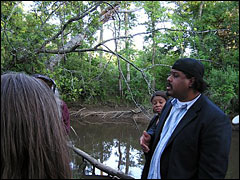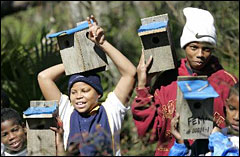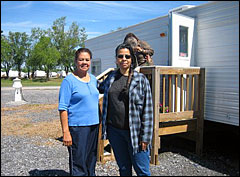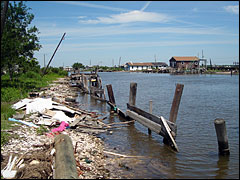A version of this piece originally appeared on the Rockefeller Philanthropy Advisors website.

The many communities of color along the Gulf Coast, be they African American, Creole, Native American, or Vietnamese American, have much in common — and not just because they’re still struggling to get back on their feet after Hurricane Katrina’s 20-foot storm surge flooded them in August 2005. These communities have been systemically marginalized for years, and Katrina and Rita only accelerated the process. Their land is literally on the verge of disappearing, whether through coastal erosion, urban sprawl, or contamination. It threatens to take with it the incredibly rich and irreplaceable culture of these communities of self-described Bayou people.
This August, hordes of press descended to report on the second anniversary of Katrina. But when they departed, they left behind communities whose work is far from done. I spoke with leaders from two such communities: Turkey Creek, near Gulfport on the Mississippi Gulf Coast; and Grand Bayou in lower Plaquemines Parish, at the very southeastern edge of Louisiana, where the land finally cedes to the Gulf of Mexico.
Both communities have partnered with the Gulf Coast Fund for Community Renewal and Ecological Health, a collaborative initiative between grantmakers and community leaders from across the entire region affected by Katrina and Rita. To date, the fund — which I project manage — has supported nearly 100 grassroots and community-based organizations from the region. Many of these groups are engaged not only in ensuring a just and sustainable recovery, but in modeling innovative work that melds issues of environmental, social, and economic justice.
The stories below are part of a greater story about the state of our country, and the evolution of environmentalism.
‘This Is a Disaster That Keeps On Giving’
Derrick Evans
Founder and director of Turkey Creek Community Initiatives

Derrick Evans of TCCI leads a tour of Turkey Creek.
Photo: Marni Rosen
Turkey Creek is an African-American community that can trace its origins back to Civil War Reconstruction, when four freed-slave couples were each given 40 acres of land. Today’s residents are descended from those founding couples, and the eighth generation (about 5 years old now) can fish and play in the same waters that drew their ancestors to the place nearly 150 years ago. After decades of battling contamination from creosote plants and other industrial facilities, Turkey Creek is now working to stave off encroaching wetlands destruction and urban development that threatens the continued existence of their community.
What are the main issues your community is facing today?
We were working prior to Katrina to address issues caused by the absence of government accountability, like environmental protection and recognition and protection of cultural resources. The Gulf South is a place where marginalized communities are marginalized like nowhere else in the U.S. We were working on planning for community revitalization against tremendous odds, in the context of zero government accountability. Then the worst disaster in U.S. history comes along, and we still see zero in government response. Two years out, all of the recovery we have seen is not due to any help from government, but to the billions of dollars of volunteer labor and the wisdom of our community organizations.
How do you see the interlocking issues of environmental justice, social justice, and economic justice playing out in your community?
Those issues are played out every day and in every way in Turkey Creek and coastal Mississippi. I know the foolishness of taking on everything that confronts a community. You can’t do everything. But the thing is, we have no choice. The local, state government, and the private sector institutions that should be engaged in this hurricane-recovery work, this environmental-justice work, this cultural-continuity-inducing work aren’t doing it. So we have to do it all. And the emotional, physical, spiritual toll on us is great.
What keeps us going is the victories that we do win. We’re really good at making so much happen with nothing. Since Katrina, we’re working with all kinds of new partners in many new ways. Whether it’s helping the Vietnamese community of East Biloxi fight against total displacement, fighting 40-year-old battles on creosote contamination, or getting African-American neighborhoods registered as historic places, it all fits together and it’s all part of the reconstruction.
How do you think the struggles and successes unfolding in the Gulf Coast relate to the greater story about the state of our country?
However broadly you want to define it, whether it’s Turkey Creek, coastal Mississippi, or the whole region that needs to be rebuilt, there has never been a multi-year, entire-generation-consuming task of reconstruction like what’s going on here. It’s significant for the future of the Gulf South. But, like Southern Reconstruction after slavery, it’s quintessentially important to the future of the nation. Whatever practices or values win the day here will eventually unfold across the entire country. The method for how to reinvigorate a community or how to let it die will be mastered and perfected in this region in the next five to 10 years. It will then come calling to cities all over this country.
If you want to take the cynical view, it’s how you finish off American inner cities. The optimistic view is how do you raise these places up from the ashes, and not only make them viable and self-sufficient, but also make them a model for what is possible for urban revitalization in the 21st century.
If you are not active or figuring out how to be effectively active during the first decade of the 21st century in the Gulf South, you are like people of the 19th century who had nothing to say about slavery, or the 20th century who didn’t see the civil-rights movement coming. Those are people who missed the crisis of their time. Katrina is the North American crisis of our time. Just like slavery, Jim Crow, or the Great Depression.
What do Katrina and Rita mean for the evolution of environmentalism?

“Housing Recovery for the Birds,” part of a TCCI event.
Photo: TCCI
It’s no secret that environmentalists tend to be overwhelmingly white, and that many within environmentalism would like to see that change. This is a fantastic opportunity to achieve that change. The Gulf South region is, to say the least, not overwhelmingly white. You’ve got readymade environmentalists in these communities of color all along the coast. Many of them are Bayou people, who intrinsically understand about the environment. Environmentalists need to recognize that they cannot fail to have this region, and the whole Katrina dimensions of it, inform, invigorate, broaden, and redefine environmentalism.
The environmental community would be greatly enriched by coming down here and learning from the incredible people doing fantastic work against enormous odds. If they fail to seize this opportunity, it’s environmentalism’s loss. Like what we’re seeing in the Lower Ninth Ward of New Orleans. No one is expecting black people in the Lower Ninth who are struggling to rebuild to be talking about being the nation’s first carbon-neutral community, but that’s exactly what they’re doing. Nobody would think that Turkey Creek residents who are fighting Superfund sites, airport expansion, and urban sprawl would be talking about creating a bird-watching sanctuary, but that is exactly what we’re doing.
Any final thoughts?
This is a disaster that keeps on giving. There is no aftermath of Katrina, because we’re still in the midst of it. I believe in Turkey Creek and the work we are doing to save the irreplaceable culture and natural heritage of this place, but I have no illusions about what we’re up against. Win or lose, it shall be instructive.
‘We’re Not Going Anywhere’
Ruby Ancar, Rosina Philippe, and Paul Sylve
Grand Bayou Community United

Ruby Ancar and Rosina Philippe of Grand Bayou, in front of a FEMA trailer.
Photo: Marni Rosen
Grand Bayou is a Native American Atakapa and Creole fishing village, accessible only by boat, whose community members can trace their roots back thousands of years. No one from Grand Bayou has been able to return home since Katrina hit — they remain scattered in FEMA trailers and their community still lies in tatters, looking as it did just days after the hurricane. Grand Bayou Community United is a group that’s not just fighting to come home, they are advocating for green rebuilding, alternative energy sources, and the establishment of the first worker-owned cooperative shrimp and fish dock in Plaquemines Parish.
What are the main issues your community is facing today?
Philippe: We find that two years out, the quick-fix programs that the federal, state, and local government had did not fit with our community and its needs. They had a one-size-fits-all plan, with no alternative solutions. If it didn’t fit in with your community or environment you had to go out on your own and find resources to aid in your own recovery.
Ancar: In the aftermath, rules and regulations kept changing. You would be in compliance to receive government funding, and before you could do anything, they would change the criteria on you again. It’s like they are making it as hard as possible for us to rebuild our houses.
Sylve: In lower Plaquemines Parish, very few people are wealthy. A lot of people are waiting on their Road Home money to help them put their lives back together. And Plaquemines Parish is sinking, literally. The government says we have to raise our houses, but we don’t have the money.
Philippe: We wanted to bulkhead in Grand Bayou to preserve our land. We have been doing this for generations, putting sheet piling or something at the water’s edge to stem erosion. Now people have come in and told us we can no longer bulkhead, that we need a permit we can’t afford. The wealthy fishing and vacation developments are allowed to bulkhead, and we no longer are. This means our community and the land it sits on are literally going to disappear.
Another huge problem two years out from Katrina is all the dumps. While the parish was still under a declared state of emergency, instead of paying to have debris disposed of properly they dug huge trenches, put all the garbage in there and covered it up. So now you have these huge waste sites that have never been monitored. These dumps will leach into the water and affect everyone.
Where is everybody from your community now?
Sylve: Nobody has been able to move back to Grand Bayou. We’re all in FEMA trailers, scattered throughout the state of Louisiana. We are scattered everywhere still. Patiently waiting to come back home.
Philippe: Not so patiently waiting. I’m not as calm as that. We’re working feverishly to do whatever we can, wherever we can. Networking and partnering with people not just to get back, but to move forward in the right way. We continue to talk with everyone about how we can come back in a more energy-efficient and green way, but the cost is prohibitive. We’ve been talking about green building and alternative energy for years. We would love Grand Bayou to be a model of sustainability for marsh communities everywhere.
How do you see the interlocking issues of environmental justice, social justice, and economic justice playing out in your community?
Sylve: There is a discrepancy. Some people say that we should know better than to live in a flood-prone, hurricane-prone area. They want to say that we “choose” to live on Grand Bayou. It’s not necessarily a way of choice. This is where we have been since before there even was a state of Louisiana or a Plaquemines Parish. Now they want to tell us we can’t apply for aid because of where we live. But as a group, this is our home. If they drive us out, what’s going to stop them from coming for you and your community?
Philippe: There’s been a lot of racial, social, environmental injustice perpetuated against our communities over a long period of time. As long as we were separate and fractured they were able to continue. Since the storm we have seen the benefits of coming together and partnering and forming alliances. I think it’s a new day. But we have to fight this machine that was in place, and these people who have deep pockets and connections. But we know that what we’re doing is right. We see the benefits of bringing human rights back to the people of Grand Bayou and other coastal communities. We’re ready to do our part in the arena of justice for everybody.
How do you think the struggles and successes unfolding in the Gulf Coast relate to the greater story about the state of our country?

Storm damage and debris in Grand Bayou, two years after Hurricane Katrina.
Photo: Al White
Philippe: Grand Bayou is a small community. I know people feel a disconnect. This is something happening in coastal Louisiana, not in their community. But the industries here affect people living in any state. Whether you’re living on the coast, or benefiting from the resources that come out of the coast, whatever happens there, you will feel it further up the line. New Orleans suffered because of the destruction of our marshes and wetlands. We had been crying out about it for years, but people were not taking action. If it doesn’t affect you today, it’ll affect you tomorrow, personally or economically. We have to start thinking globally, and get away from “them and us.”
What lessons does your community have for environmentalism?
Sylve: People are finally realizing that the Mississippi River Gulf Outlet is a major source of erosion, and why the storm surge was so bad. If they had taken notice of Grand Bayou and our culture and listened to the people in these regions, MRGO would never have happened. Had they listened to our people, not our book knowledge, just what we know from our way of life, they would have seen the need to put a stop to it.
Philippe: One of the biggest losses if people are forced to move out of the Bayou is the loss of ecological and historical knowledge of the region. We have know-how that can form the foundation of rebuilding in ways that makes sense. We have the history and the knowledge. It will be an irreparable loss if we are driven out of the region.
Ancar: You destroy the people and everything else goes.
Any final thoughts?
Ancar: We’re there. We’re not going anywhere. We need to raise the awareness about our community and what we are facing, and we need the resources so that we can come back.
Philippe: We know this is like the Buddhist proverb, the “journey of a thousand miles that begins with a single step.” The work we are doing, we may not live to see the benefits of it. But we have to work for the future, and know that the work today has longevity beyond our existence.

